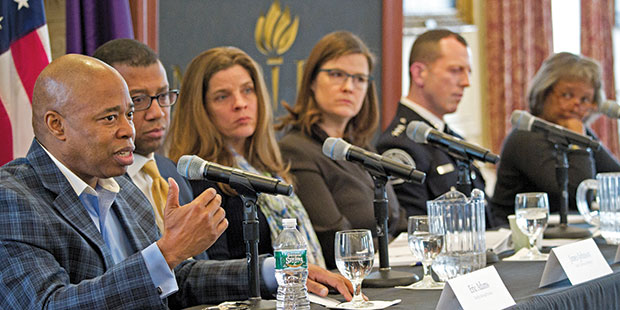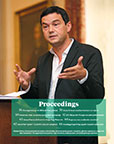Zeitguests
In the past year the Law School’s regular Wednesday platform for ideas has focused on leadership, antiterrorism, racial injustice, and other urgent issues.
Printer Friendly VersionThe Milbank Tweed Forum, the weekly lunchtime panel that brings heavy-hitting intellectuals to NYU Law to discuss current issues intersecting with the legal field, continued to attract marquee names in its sixth year, hosting an NFL franchise owner, the country’s highest-profile special master, and a top death row defense attorney, among others.
Last October, Stephen Ross LLM ’66, founder of the global real estate development firm the Related Companies and majority owner of the Miami Dolphins, dropped by with friend and legal advisor Martin Edelman to share his views on leadership with students and the moderator, Dean Trevor Morrison. (See related story.)
Ross, who practiced law briefly before starting his own company in 1971, stressed the importance of following one’s passions, which, he said, increased the likelihood of success. He also explained how his legal training has been valuable, despite his non-traditional path after law school.
“A legal education really opens your mind to thinking in a certain organized way,” said Ross, adding, “Being able to think a certain way and understand everything that’s going on around you puts you in a better position to succeed.”
Harold Koh, former State Department legal adviser in the Obama administration and a distinguished scholar in residence at NYU Law during the last academic year, made an appearance in February to consider how to end the “forever war” against terrorism and fight the extremist organization ISIL.
Pointing out that the post-9/11 armed conflict with al Qaeda, the Taliban, and associated forces is now the longest-running such offensive in US history, Koh discussed the difficulties in dealing with the open-ended authorization for the use of military force that has governed such matters since 2001. In particular, he analyzed the precarious position of President Obama as he tries to end preexisting Middle Eastern conflicts while still protecting national security.
Putting a personal spin on the quandaries of antiterrorism, Koh explained that many senior al Qaeda operatives were the same age as the students in the room, and that he discovered one of the operatives was born the same day as his daughter. “I could actually track in his history what he was doing on particular days when my daughter was doing particular things,” said Koh. “This gives you a great sense of horror about the disparities of opportunity for people, and why some people become so desperate that they think that their life should be spent flying planes into buildings and cutting people’s heads off.”
Kenneth Feinberg ’70, accustomed to dealing with the aftermath of horror, visited in March to describe his experiences as special master of victim compensation funds such as those for 9/11, the Virginia Tech shootings, and the Boston Marathon bombing.
In these highly charged situations, Feinberg— whom the Treasury Department appointed last June to oversee reductions in multiemployer pension plans—likens his role to that of a chaplain or psychologist who also has the benefit of a lawyer’s skills. “You’re dealing with individual, very emotional people. It’s not about law. The law degree helps you design the program and set it up with rules and protocols. It’s human nature you’re dealing with. Individual victims and their families. Angry, frustrated, disappointed, saddened.”
Those strong emotions certainly applied to the context of the subsequent forum, which looked at potential police reform in the aftermath of the Michael Brown case in Ferguson, Missouri, and similar incidents around the country. The event followed on the heels of a Justice Department report condemning racial basis and unconstitutional practices in the Ferguson Police Department.
Christy Lopez, deputy chief of the Special Litigation Section of the DOJ’s Civil Rights Division, oversaw the “pattern and practice” probe in Ferguson, which uncovered what she described as a willful blindness to the department’s problems, as well as thinking that dehumanized the population. The town of 20,000 people, for instance, had more than 30,000 outstanding arrest warrants. “It was seen as less harmful if black people went to jail,” she said.
One of the major strategies for reform involves encouraging officers to trade in a warrior mentality for that of a guardian, said J. Scott Thomson, chief of the Camden County Police Department in New Jersey. Thomson has put more officers on walking beats, pushing them to meet community members in their daily lives and not just in crisis. Leveraging the power of community members to prevent crime is essential, he argued, adding, “What you’ll find is that in the most challenging neighborhoods, you have far more good people than bad people.”
Perhaps no one knows the repercussions of bad policing better than Professor of Clinical Law Bryan Stevenson, who has pursued justice for indigent death row defendants and others for decades. Stevenson didn’t pull any punches in describing the American criminal justice system. In the United States in 1973, there were 300,000 people in jail or prison, he said. Four decades later, that number has mushroomed to 2.3 million. (See related story.)
“I work in a broken system of justice,” Stevenson said. Nonetheless, by sharing stories taken from his career defending clients on death row, Stevenson compellingly illustrated the critical need for compassion: “Being a lawyer who can make a difference in the lives of people who need it means that you’re going to have to be the person who stands when everybody else is sitting. You’re going to have to be the person who speaks when everybody else is quiet.”
—


 Multimedia
Multimedia